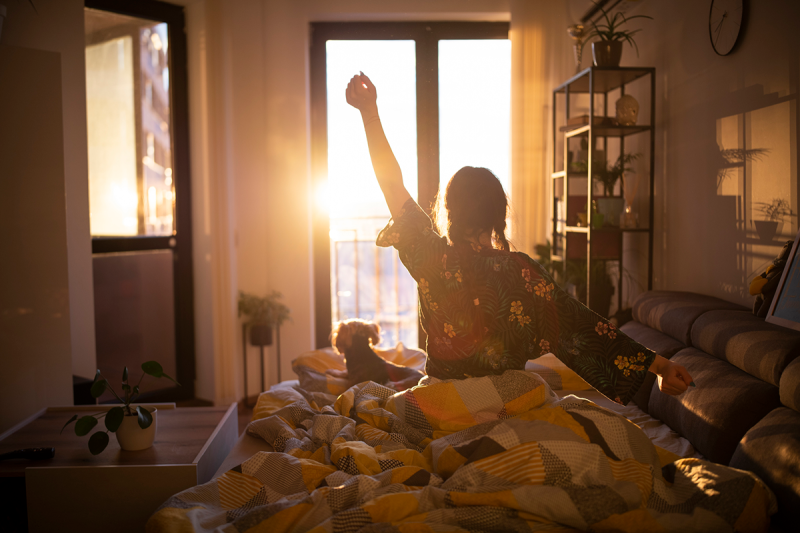When you’re trying to sleep, light is the enemy — whether from bedside lamps, TVs, smart phones, or even the streetlamp outside. Light can disrupt our circadian rhythm — our body’s natural sleep/wake cycle — making it harder for us to get to sleep and stay asleep.
But during the day, light helps keep that biological rhythm in sync. In fact, sleep researchers say that exposure to natural light soon after waking, even if that light isn’t particularly bright, can improve our sleep, helping us to get to sleep more quickly and keeping us in a sounder state of sleep.
How light impacts sleep
Humans are hardwired to sleep when it’s dark and wake when it’s light. Light is a zeitgeber, a natural cue that helps maintain your circadian rhythm.
As darkness approaches, your body naturally releases the hormone melatonin, commonly referred to as the “hormone of darkness,” which helps you feel tired. While light tends to suppress melatonin (which is why you feel more alert in the morning versus the evening), scientists have found that exposure to natural light early in the day can move the circadian clock forward and set your biological clock, which will improve sleep come bedtime.
In a large study of adults in the U.K., researchers found that the more time participants spent outdoors during the day, the less likely they were to report symptoms of insomnia and problems waking in the morning.
And it’s not just direct sunlight that produces these effects. Another study, based in the Durham, North Carolina, area, looked at workers who toiled away in offices outfitted with electrochromic glass, which optimizes daylight by using smart-tinting glass, and those working in offices outfitted with traditional blinds. Those in the offices with electrochromic glass slept 37 minutes longer at night versus those in the offices with blinds. Perhaps more impressive, researchers found that the longer sleep duration started after just one day in the office space with electrochromic glass.
The findings are supported across demographics. Researchers at the University of Washington in not-so-sunny Seattle studied some 500 of their students and found that during the darker winter months, students went to bed about 35 minutes later than during summer school days. This surprised the researchers, who predicted students would go to bed later when daylight was more prevalent.
So, what caused the earlier turn-in time during the summer months? The researchers suspect it had something to do with more exposure to daylight, which can push our circadian rhythm forward and make us feel more tired earlier in the evening.
“Sunlight during specific times of day can enhance the amplitude of your circadian clock,” explains Jamie Zeitzer, Ph.D, codirector of the Center for Sleep and Circadian Sciences at Stanford University. “Among other things, this means that you will be better able to anticipate sleep and go to sleep at a regular time.”

When should I get sunlight and how much is enough?
Experts say you don’t need a lot of sun to reap its sleep-improving benefits. But it’s important to get it as soon after waking up as possible so melatonin production is slowed.
“Getting sun exposure within the first hour of waking up can be helpful for helping the body to understand it is time to be alert and awake, which can also help it later know when it is time to start calming down and getting ready for sleep,” says Julia Kogan, a health psychologist and behavior medicine specialist. “The earlier you can get sun exposure when waking up, the better.”
The amount of sunlight needed to be beneficial varies from person to person and is also dependent on where you live and the opportunities you have to get outside. According to Kogan, 30 minutes may be all it takes.
Sleep specialists from Penn Medicine back that up, and note that 30 minutes of exposure to light measuring just 1,000 lux (about the intensity of the sun on an overcast day) is enough to put the circadian process in motion. On a sunny morning? You could be exposed to an impressive 100,000 lux.
How the sun can help you sleep
So now that you know the sun can have a powerful influence over the quantity and quality of your sleep, how do you optimize its power? Experts provide these tips:
Don’t wear sunglasses — or at least not dark ones
Since light is filtered through the eyes, wearing sunglasses will dull sunlight’s sleep-regulating effects. This isn’t to say that you should stare directly into the sun, as that can cause eye damage, but rather enjoy some time outside sans sunglasses to get the full benefits.
Do get outside even if it’s cloudy
You’re still able to get some sun exposure even if it’s an overcast day. “Cloud cover is roughly a tenth as bright as sunny skies, so if it’s a cloudy day, try to be outside in the morning, and throughout the day, for longer,” says Zeitzer.
Do sit by a window if you can’t get outside
Some of us don’t have the opportunity to get outside during the day. We may leave for work when it’s dark and head home after the sun sets. How can we still grab some of that precious sunlight? Experts advise finding a window.
“Indirect sunlight can still help,” says Kogan. “It will not send as strong a signal since it is filtered through glass, but it is still light being received by the eyes, so it can still be helpful and a great option.”
Do try a light simulator
“Sunlight simulators can be effective, provided they’re sufficiently bright (10,000 lux is roughly comparable to daylight) and you use them for long enough (~30 minutes),” says Zeitzer.
Do wear your sunscreen
Though your eyes should be unshaded, your skin should always be protected when you go out into the sun, even in the mornings. After all, sunburns are a known sleep disruptor.






